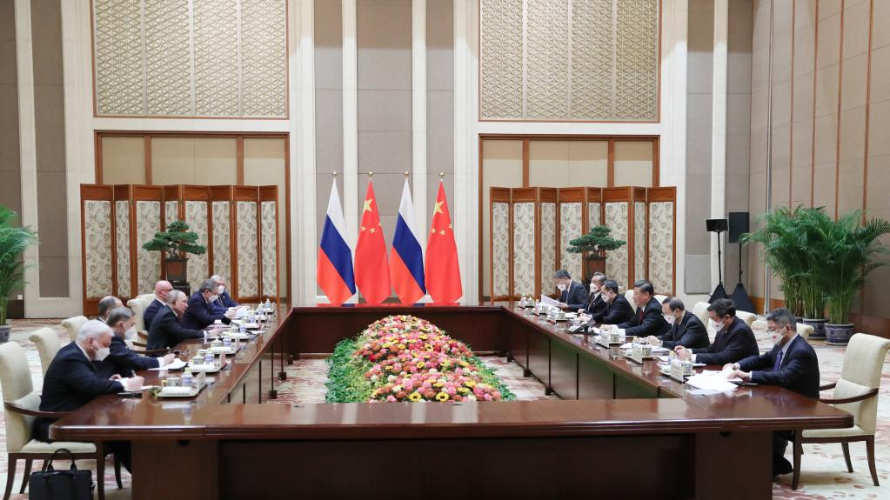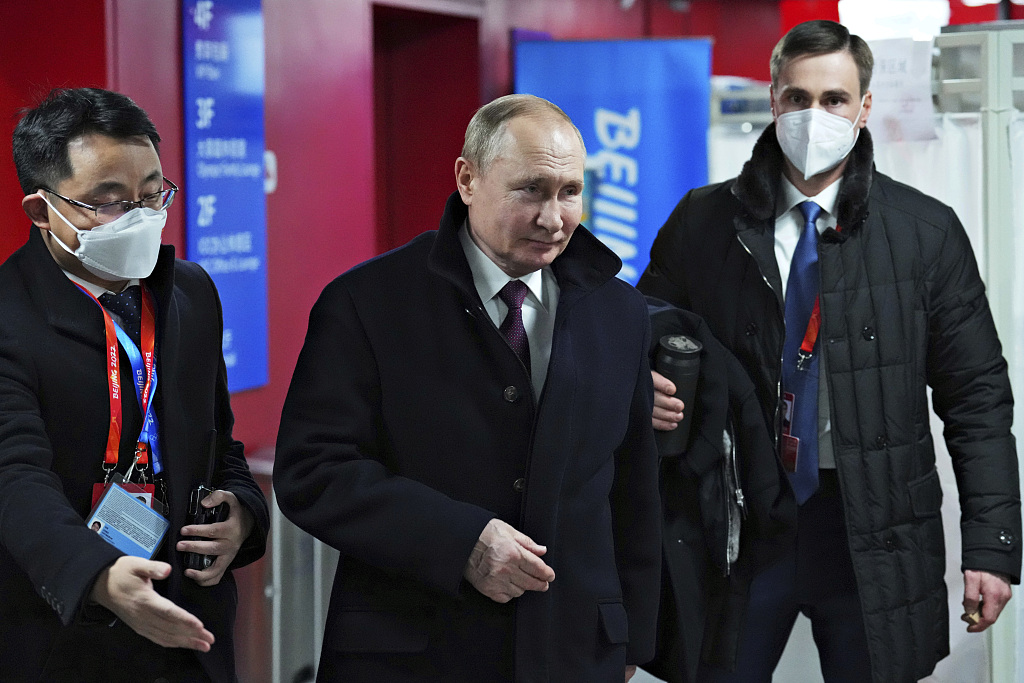
Chinese President Xi Jinping (4th R) holds talks with Russian President Vladimir Putin (4th L) at the Diaoyutai State Guesthouse in Beijing, China, February 4, 2022. /Xinhua
Chinese President Xi Jinping (4th R) holds talks with Russian President Vladimir Putin (4th L) at the Diaoyutai State Guesthouse in Beijing, China, February 4, 2022. /Xinhua
Editor's note: Hannan Hussain is a foreign affairs commentator and author. He is a Fulbright recipient at the University of Maryland, the U.S., and a former assistant researcher at Islamabad Policy Research Institute. The article reflects the author's opinions and not necessarily the views of CGTN.
Peak diplomatic convergence between China and Russia was on full display ahead of the 2022 Beijing Winter Olympics opening ceremony, as Chinese President Xi Jinping met his Russian counterpart for their highly anticipated, in-person bilateral meeting in Beijing on Friday, February 4, 2022. "Speaking about our bilateral ties, they have become unprecedented, serving as an example of worthy relations that help [both countries] to develop and at the same time support each other in this development," hailed Russian President Vladimir Putin during their exchange.
What stood out in their joint statement was rock-solid support for one another's core sovereign priorities, legitimate opposition to foreign interference in internal matters, numerous pathways for deepening the Sino-Russian strategic partnership, and a shared determination to protect the international architecture in a way that keeps no nation in the rearview.
On foreign interference, both President Xi and Putin are correct to count unilateral military advantages and intense geopolitical rivalry as actions that severely undercut the international security order. Calling out the North Atlantic Treaty Organization (NATO)'s for its use of Cold-war ideological tactics is of particular value, given its present role in promoting war hysteria vis-à-vis Ukraine, ignorance of legitimate Russian security demands, and rhetoric that presumes that the West's sole purpose is to oppose all else. Similarly, actions promoted through a geopolitical containment lens – such as through the U.S.-led Indo-Pacific strategy – reveal nothing but a polarizing contrast to the open and inclusive security system efforts championed by Russia and China, acknowledged by the leaders and in line with an Asia-Pacific region free from bloc politics.
The spirit of that championship could also be observed in President Xi and Putin's serious concerns surrounding nuclear submarine cooperation in the Asia Pacific by the United Kingdom, U.S. and Australia (under the so-called "AUKUS"). It is clear that such skewed constructs of "cooperation" serve as a recipe for intensifying risks of an arms race in the region. More deeply, they run contrary to what President Xi and Putin rightly noted as the task of guaranteeing security and sustainable development in the Asia Pacific region. As a result, both leaders' firm call for AUKUS participants to sincerely meet their "nuclear and missile non-proliferation commitments," translates into a tangible representation of peace and stability being put above all else.
Interestingly, Friday's meeting testified to the wealth of diplomatic symbolism and mutual respect that shines through Sino-Russian ties. After all, this was the 38th meeting between Presidents Xi and Putin since 2013. The meeting also took place just before the opening ceremony of the Beijing Winter Olympics, an event welcomed in Putin's presence and met with complete certainty on success. "We know first-hand that this is a huge work. I am certain that our Chinese friends did it perfectly, as you always do when preparing for such major events," said Putin.

Russian President Vladimir Putin arrives for the opening ceremony of the 2022 Winter Olympics in Beijing, China, February 4, 2022. /CFP
Russian President Vladimir Putin arrives for the opening ceremony of the 2022 Winter Olympics in Beijing, China, February 4, 2022. /CFP
On bilateral strengths, the deepening of China and Russia's strategic partnership through multilateral frameworks makes it certain that the latitude for future engagement is substantial.
Consider BRICS. President Xi and Putin's determination to expand cooperation in areas of politics and security, economics and finance, and humanitarian exchanges, could be a major step for strengthening BRICS's international integration profile, and tailoring the benefits of increased coordination to all member states without exception. Similarly, increased synchronization between the Eurasian Economic Union (EAEU) and China's Belt and Road Initiative (BRI) offers a valuable bridge between two major markets, especially with the coordinated build-up of the Greater Eurasian Partnership. Both the EAEU and the BRI can inform valuable developmental experiences because of their past successes, effectively strengthening prospects of scaling those advantages across regions "for the benefit of the peoples on the Eurasian continent."
Staying true to their support for an international trade system free of discrimination, President Xi and Putin's pushback against unilateralism and protectionism at the World Trade Organization is also commendable.
It is commendable because these positions serve the much-needed global imperative of protecting "universally recognized formats and mechanisms" from the perils of subversion. The dangers to these formats and mechanisms are not abstract: China and Russia's opposition to power politics, bullying, unilateral sanctions, and several other tactics puts a check on select nations and blocs that wish to advance them at the expense of international practice. Moreover, President Xi and Putin's opposition to unilateral conduct in trade is also a powerful reminder that there is no substitute to universally recognized norms or representative consensus.
In conclusion, the Xi-Putin meeting exceeded expectations through its wide-ranging diplomatic consensus, coordinated support against global challenges, and new partnership frontiers. It will be remembered for its undivided support for international relations in the new era, and for reinforcing what genuinely inclusive development means in the interests of all.
(If you want to contribute and have specific expertise, please contact us at opinions@cgtn.com.)

